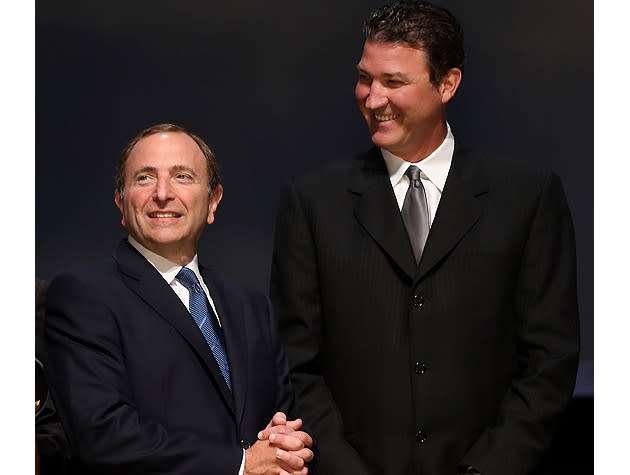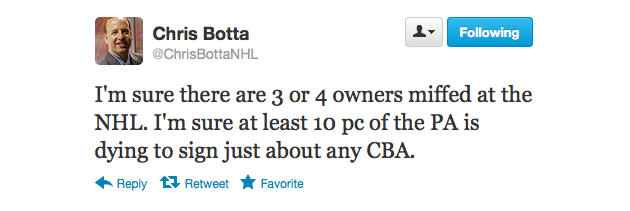Why cracks in NHL ownership don’t matter
Over the last several months, the NHL players and their proxies (agents, media) have railed against the League for silencing its owners during the lockout.
The prevailing wisdom: That sans muzzle (i.e. the threat of a Devellano-esque fine), a group of maverick owners opposed to the work stoppage would break ranks and exert public pressure on Gary Bettman (i.e. the man they pay to stop work) to end the lockout.
The latest example from these protectors of the first amendment: Dan Boyle of the San Jose Sharks. As he told CSN Bay Area:
"I think when players make comments, sometimes it's directed towards 30 owners, but I think a lot of us feel that it's not across the board. It's a certain group of teams that are controlling 30 others," Boyle said.
"It doesn't make any sense to me that eight teams can control the fate of 22 other ones."
Bruce Garrioch of the Ottawa Sun carried the meme through to his Sunday column:
The owners got "cost-certainty" through a cap the last time we were in this situation. It wouldn't seem it is worth losing a season this time, since the framework is there to put a deal in place.
The insider with knowledge of the bargaining suggested Bettman has the support from the board of governors and those who don't like the idea of the lockout are sitting silent to see if the NHL can get the union to bend.
"The dissenters are being quiet and waiting to see how far (Bettman) can (make) Fehr go," he said. The dissenters have no choice. Speaking out could mean a fine of up to $1 million and a loss of draft choices.
There are a few reasons why the players and their agents are hung up on the owner solidarity thing, which smacks of desperation and denial of reality.
Fear Of Their Own Solidarity
After the NHLPA cracked like a wine glass on a brick wall back in 2005, the players have gone out of their way to declare solidarity in this round of CBA talks. It was one of the primary motivations for bringing Donald Fehr in to lead the union, right behind his ability to make Gary Bettman seem like the second-smartest man in the room.
And so it is that the NHLPA members tweet the same messages and fly off to Europe en masse and start predicting they'll go the distance on the lockout and take their little jabs at Bettman. But the underlying truth of it all is that there's a much better chance that 740 members of the NHLPA — of different economic and experience standings — will fracture well before 30 owners will.
As Chris Botta tweeted:
It's a race to the breaking point, and the players know that their opponents have an advantage in their numbers and in Bettman being the one holding the leash on his owners.
Preconceptions of Motivation
As Reusch wrote recently, there's every reason to believe that Geoff Molson doesn't want the Montreal Canadiens locked out. The same thing goes for other teams that print their own money (the New York Rangers) or that would like to capitalize on the NHL's surging popularity (the Los Angeles Kings).
The tricky part is that every owner has dueling motivations in this negotiation.
Yes, it's obvious that a team like the Nashville Predators would like to get back on the ice and continue building momentum in their market. It's also obvious they'd benefit from reduced player costs and stronger revenue sharing, which will only arrive through the lockout.
Yes, it's easy to assume an owner like Terry Pegula that's worked the current system, and isn't exactly hurting for money, would rather his Buffalo Sabres challenge for the Stanley Cup than have them locked out. Yet if the Sabres, say, ever started their own local sports network, perhaps they'd like the financial solvency to cover losses. Or perhaps they don't really want to be the team that hands out a massive second contract like the one given to Tyler Myers when the franchise lost money in five of six NHL seasons between '05-'06 to '10-'11.
Same goes for every owner that makes a ton of money at the gate but sees it fly out the window to players making 57 percent of it; and every owner that's seen his ancillary costs rise as the players' share has grown.
Bottom line: While none of this is a reason to kill another season, let's not pretend that even the wealthiest and most altruistic among NHL owners isn't looking to knock down the players' share.
It's The Logo On The Front
Please recall Dan Boyle's words:
"It doesn't make any sense to me that eight teams can control the fate of 22 other ones."
It doesn't? Here, lemme help:
These are the total appearances for NHL teams on the NBC/NBCSN schedule for 2012-13, which has pretty much gone the way of Crystal Pepsi and the PT Cruiser thanks to the schedule cancellation.
As you can see, there are 10 teams that are featured more than 10 times combined on the networks. For NBC, there only five teams featured three or more times: Jeremy Jacobs' Boston Bruins, Rocky Wirtz's Chicago Blackhawks, Mike Illitch's Detroit Red Wings, Ed Snider's Philadelphia Flyers and Mario Lemieux's Pittsburgh Penguins.
So yes, it makes sense that about eight teams can control the fate of 22 others because they're the only ones worth a damn from an American television perspective.
That $3.3 billion in revenue generated last year? You seriously don't believe that's the byproduct of having Original Six teams in four of the last five Cup Finals, along with the Penguins (twice) and the Flyers? Or Original Six teams and/or Sidney Crosby in every Winter Classic?
Again, the truth of matter: It's a team-driven league that has at most four players that actually drive gate — Sidney Crosby, Alex Ovechkin, Steven Stamkos (potentially) and Jaromir Jagr (at least in the Dallas Stars' eyes). Otherwise, fans are paying and tuning in to see the logo on the front.
So it makes perfect sense that the needs of the few outweigh the needs of the many in ownership, because in the end they're the ones carrying the torch for the League's popularity and sharing their wealth with the weaker franchises.
Which is why you and I have never been invited to sleep over the Lincoln bedroom, to draw a political parallel.
Finally …
Talk To Us When You Learn Your Owner's Name
Granted, there are 11 names on the Sharks' ownership board, but Boyle surely knows about Sharks Sports and Entertainment. They're the ones claiming a $15 million loss last season despite 41 sell outs. They're also the ones that sign Boyle's checks.
No one's expecting Boyle or his peers to trash their employers with the same vicious fervor as they would Bettman. But is it too much to ask for a guy like Boyle to name names? To tell us where he thinks his owners stand? To explain which teams he believes are all-in for a lockout and which ones are along for the ride?
In reality, it's the only way to really put the screws to the owners: To have their own players call them out to paying customers by name as the real enemy.
Think it'll happen? Of course not.
Otherwise, it's just hopeful speculation. That these owners aren't more concerned about a Canadian television windfall in a few years than they are about winning a Stanley Cup. That "man of the people" owners like Terry Pegula, Mario Lemieux and Ted Leonsis don't actually support Bettman in his work stoppage, when they have every motivation to guarantee profit and cut player costs.
Ask yourself this question: Is there a greater percentage of owners or players that want to get back on NHL ice tomorrow? Who cracks first?

 Yahoo Sports
Yahoo Sports 




